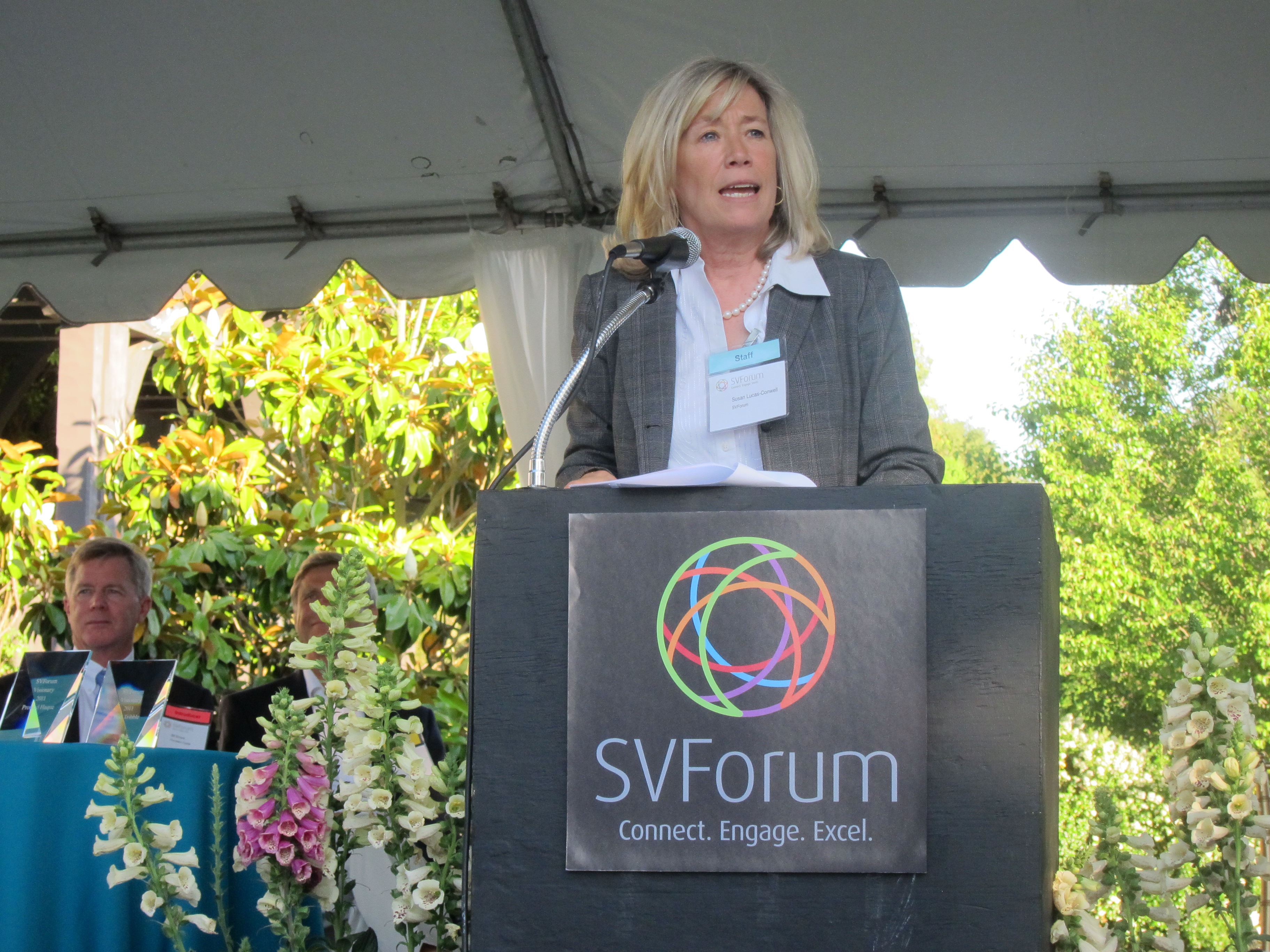
Jun 23, 2011 | Education, Entrepreneurship & Innovation, Silicon Valley Events
By Alison van Diggelen, host of Fresh Dialogues
The 2011 Visionary Awards Ceremony was held at the home of Kelly Porter in Los Altos Hills on June 21, the longest… and also the hottest day of the year. This annual ceremony – the Oscars of Silicon Valley – honored four distinguished technology innovators – Dr. Hermann Hauser (Amadeus Capital Partners), Promod Haque (Norwest Venture Partners), Bud Tribble (Apple Inc.) and TJ Rodgers (Cypress Semiconductor Corporation). Presented by SVForum, previously SDForum, “SV” Silicon Valley – was an important theme of the evening. In accepting their awards, honorees attempted to answer the question: what makes Silicon Valley unique? Or in the case of TJ Rodgers, what makes him unique?
The energetic Susan Lucas-Conwell kicked things off by announcing the new-look SVForum – which has outgrown its SDForum, Software Development status – and is now focused on its Silicon Valley roots. “We continue to grow and evolve,” she said. “We serve a broad footprint covering the entire technology industry.” Interesting to note that cleantech was the first sector she cited, along with the usual suspects: healthcare, IT, software, social media, cloud etc. With a jazzy new logo and a succinct mission to connect, engage and excel; SVForum looks poised for an exciting new chapter.
Promod Haque was introduced by Ken Comee of IBM who promised a “This is your Life” moment. Much to the relief of the audience, it was more of a 21st Century Twitter version (ie short and pithy). Promod began by reflecting on the uniqueness of being a venture capitalist in Silicon Valley – its philosophy and values. There was a collective holding of breath. Were we about to hear the Holy Grail of Silicon Valley?
“The freedom to fail is unique about Silicon Valley,” said Promod. “It’s an essential piece of innovating.” Déjà vu anyone? It’s a popular – even over-used – refrain these days and one that has surfaced previously at the Visionary Awards. Anyone remember Vinod Khosla expound the same philosophy at the 2009 Visionary Awards? Déjà vu or not, Promod’s comments underlined the consensus that it’s a vital part of Silicon Valley’s magic.
Promod then elaborated…“I tell my kids…my entrepreneurs, ‘when you do have failure, it’s not a person, it’s an event in their life. Don’t let it scare you…don’t let it define you.’” Well said. But is the secret sauce of Silicon Valley no longer a big secret?
Next up, Apple’s Bud Tribble, who was introduced by Dan’l Lewin of Microsoft. Dan’l gave us an odd lesson in our A,B,Cs before he got on the crux of the intro: “When Bud speaks, people – like Steve Jobs – listen – and that’s hard!” Dan’l alluded to Apple’s Location-Gate drama, but Bud wisely eschewed the subject, instead enthusing about the special qualities of Silicon Valley. He emphasized the importance of perspectives and how we connect . In Silicon Valley, “the connections go beyond companies – that’s the magic of this place.” As for vision? That all depends on your perspective and he quoted from Alan Kay (the pioneering computer scientist): “Perspective is worth 80 IQ points.” He also took us back to the early days of Apple in the 80’s and described the wide variety of perspectives around the table, including an archeologist and even a Marxist (!) as well as the inevitable computer programmer. Understanding what computers are really good at is key, said Bud. And what is that? Communication. That’s his focus. As for the future, Bud wasn’t giving anything away. True to his solid Apple pedigree, Bud concluded by saying, “I can’t really talk about the future… since I’m at Apple.” A visionary who is keeping his vision tightly under wraps…for the time being.
Later, I asked Bud how Mr. Jobs is doing and if he thinks Jobs is going to come back to the helm on a full time basis. “He finds it hard to stay away,” said Bud. Indeed.
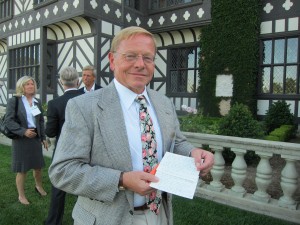 T.J. Rodgers was introduced by Eric Benhamou of Benhamou Ventures and described Rodgers as “a tough boss, argumentative and very competitive,” and added “I’m using polite language here.” The audience was well amused .
T.J. Rodgers was introduced by Eric Benhamou of Benhamou Ventures and described Rodgers as “a tough boss, argumentative and very competitive,” and added “I’m using polite language here.” The audience was well amused .
To be continued…
Meantime, check out many more PHOTOS
Video highlights
For more on Silicon Valley events click here
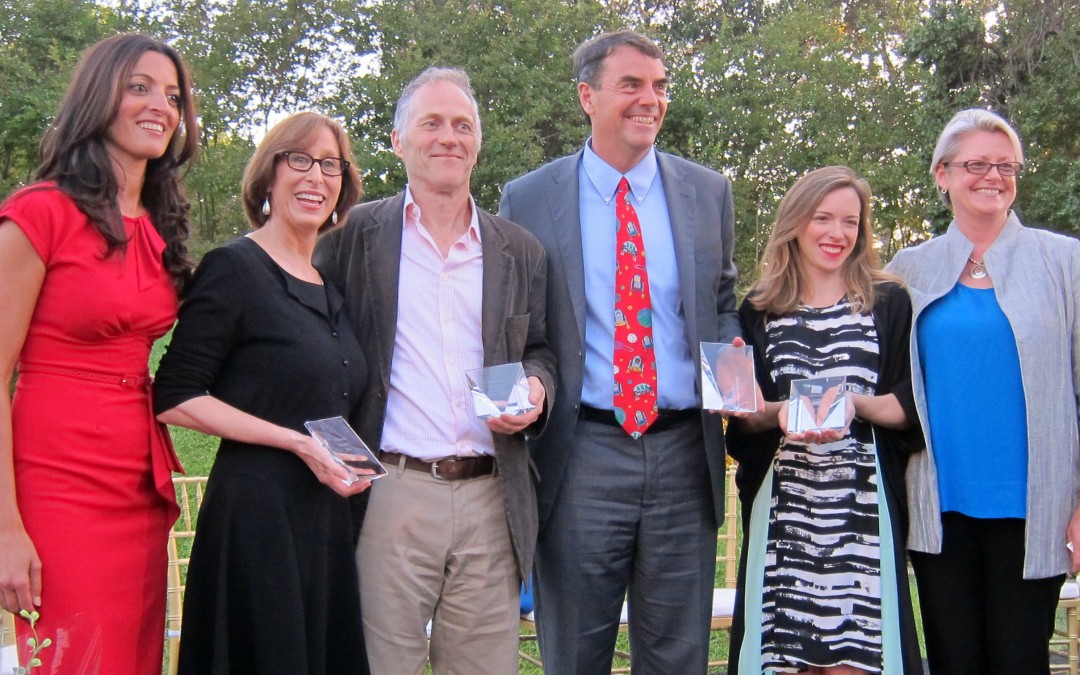
Jun 5, 2014 | Entrepreneurship & Innovation, Inspiring Women, Social Entrepreneurs
By Alison van Diggelen, host of Fresh Dialogues
The dynamic new CEO of SVForum, Adiba Barney rolled out the red carpet this week for the 17th Visionary Awards. But despite all the glitz and glamor, there was a strong message: use tech to make the world better. Of course, each recipient has an impressive resume: Jessica Jackley, cofounder of Kiva; Tim O’Reilly, open source advocate and media producer; Tina Seelig, director of Stanford Tech Ventures Program; and Tim Draper, founder of Draper University and partner at DFJ Ventures. But how did each get where they are today and what can you learn from their journey?
Here are some of the lessons the visionaries shared at Tuesday’s event:
1. Ask: what if?
Jackley witnessed a new level of poverty while working in Africa and when she returned to Silicon Valley, she wanted to help change some lives, especially those with an entrepreneurial drive. She said, “People in Silicon Valley are always talking about the future…so ask: what if?”
Her inspiration? She was killing time at Stanford University one evening, and just happened to attend a talk by Muhammad Yunis, the Nobel Prize winning founder of “banker to the poor” Grameen Bank. His success helped launch the microlending phenomenon and inspired Kiva, a nonprofit microlender that’s now shared over half a billion dollars in startup funds with entrepreneurs around the world.
2. Have some accidents
Tim Draper confessed that he often discovered and backed companies like Skype by complete accident. Often he was actually looking for, or working on something else. His message: “If you want to be a visionary, go out and have some accidents!” And he proceeded to fling his glass of water into the crowd. Fortunately there were no injuries, though fellow journalist, Tom Foremski got the brunt of the baptism.
3. Go for love not money
Tim O’Reilly said “I urge you all: do things for love, with no expectation of return…celebrate the success of people who make a difference.” He described Silicon Valley as a place “for people who dream, who care…about stuff other than making an exit.”
Although he’s a big believer in the power of the markets, he underlined the obligation to “give back” and in his great literary style, he even quoted a passage from Victor Hugo’s “Les Miserables” to underline his point that an entrepreneur should think “much of others, and little of him (or her) self.” He’s recently embraced the vision of Jennifer Pahlka’s Code for America. It helps bring more top tech talent into government (e.g. the tech team that went to D.C. to help rescue HealthCare.Gov’s disastrous rollout).
“We need to fix government, not abandon it!” said O’Reilly.
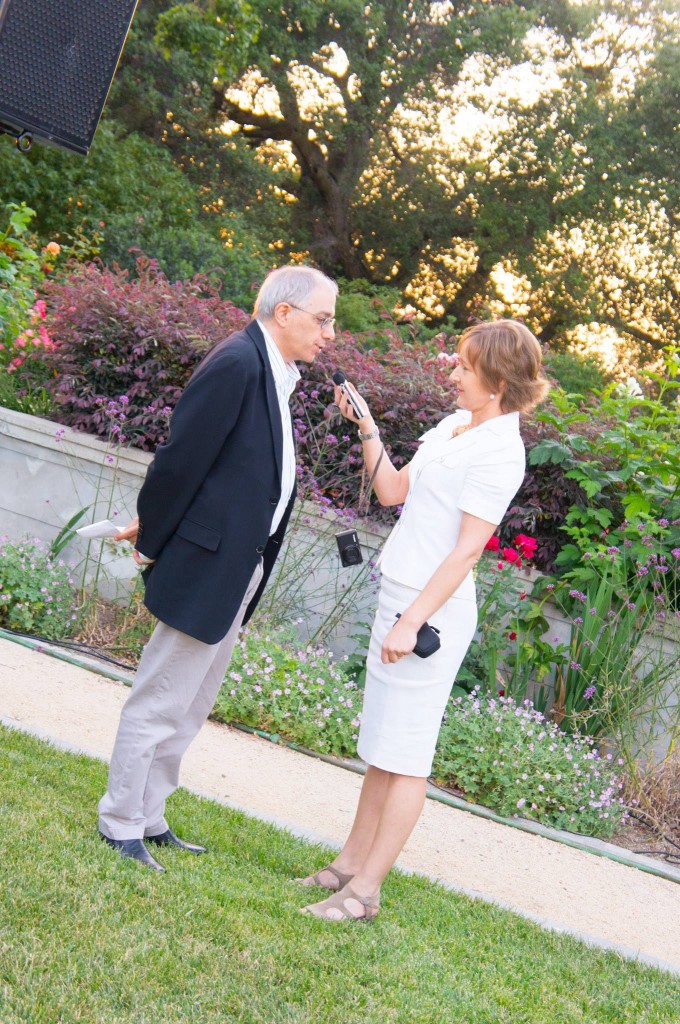 4. Never miss an opportunity to be fabulous
4. Never miss an opportunity to be fabulous
Tina Seelig is the epitome of Silicon Valley passion for entrepreneurship and technology; and urges us all to ask big questions. Her mantra is “never miss an opportunity to be fabulous” and although she didn’t say it, her energetic body language seemed to be chanelling Adele’s line from Rolling in the Deep: “Throw your soul through every open door!”
5. Have a passion for “Yes”
Steven Levy, a senior writer at Wired Magazine, and former honoree himself, introduced Tim O’Reilly and reminded everyone that behind every “no” is a “yes.”
“At the core of Silicon Valley is a passion for yes,” he said. “This is the place where people don’t look for reasons to say no…(instead) someone comes up with a crazy idea and they have permission to do it.”
Presumably he means, if you want to be a real tech visionary, there’s no place like Silicon Valley.
Check back soon for Fresh Dialogues interviews with Jessica Jackley, Tina Seelig, Jennifer Pahlka and Tim Draper.
This SVForum event took place at the home of Kelly Porter in Los Altos Hills on Tuesday June 3rd, 2014.
Photo credit: Tom Foremski
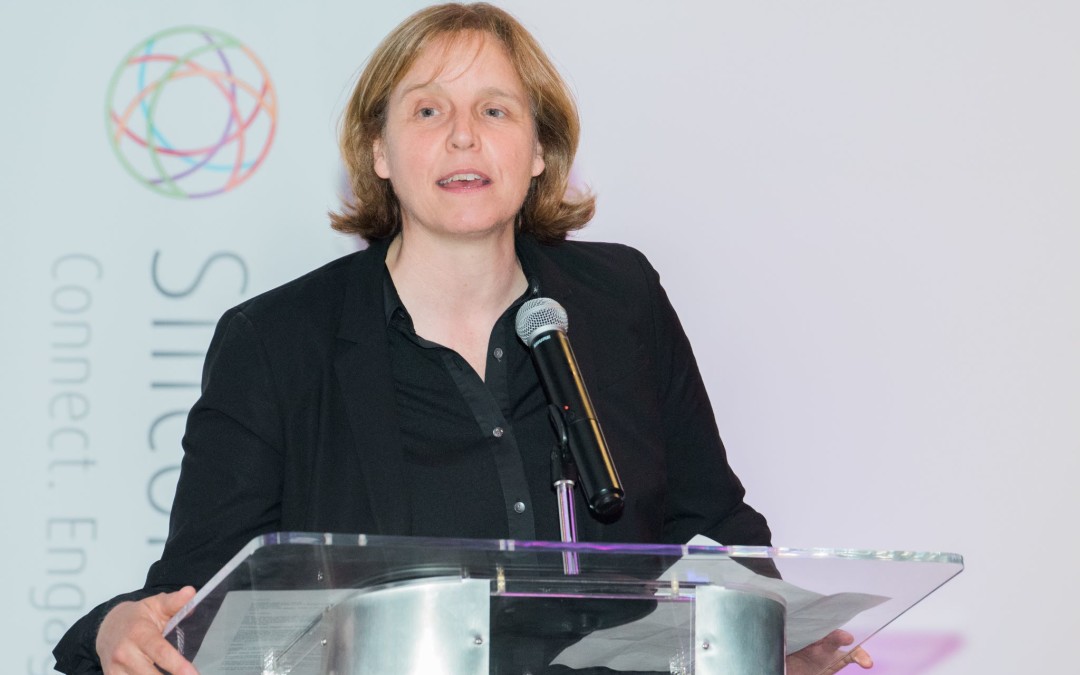
Jun 20, 2017 | BBC World Service, Inspiring Women
Some call it “The Oscars of Silicon Valley.” This year, the glitzy, red carpet affair celebrated four Wonder Women: Megan Smith, Ann Winblad, Neri Oxman and Linda Rottenberg. Alison van Diggelen reports on SVForum’s Visionary Awards for the BBC World Service. What are the secrets of these Wonder Womens’ success, and what do they think needs done to bring more women into the tech field?
Listen to the report and lively discussion with the BBC’s Fergus Nicoll. Our discussion starts at 26:00 in the podcast.
Here’s a transcript of our dialogue (edited for length and clarity):
Fergus Nicoll: Investigations reveal that women occupy only about 11% of Silicon Valley executive positions…and a tiny percentage of startups are owned by women. Are things going to change? Alison, you’ve been to an event to recognize talent in the sector…
Alison van Diggelen: Last week I attended Silicon Valley Forum’s Visionary Awards. SVForum is celebrating its 20th anniversary and unlike its usual male-dominated roster of honorees (Bill Gates, Vint Cerf, Elon Musk etc.), this year: three of its five honorees were female. I was curious to learn the secrets of their success, and what they think needs to be done to bring more women into the tech field. This is all in the context of Uber’s chief stepping down from the company this week – at least temporarily – and the company tacitly acknowledging that it needs to change what some are calling its toxic corporate culture for women. I was curious to learn the secrets of these Wonder Womens’ success, and what do they think needs to be done to bring more women into the tech field?
[Atmos: Crowd, music, welcome]
SVForum CEO, Denyse Cardozo: Good evening and welcome to the 20th anniversary Visionary Awards….
Alison van Diggelen: Just before she went onstage, I found tech pioneer Megan Smith surrounded by a group of adoring fans. She was President Obama’s Chief Technology Officer and now she’s back from DC her rockstar status is soaring among the technorati. You might even call her Silicon Valley’s Wonder Woman. Tall and forceful, she oozes enthusiasm and credits the valley’s unique ecosystem for her success.
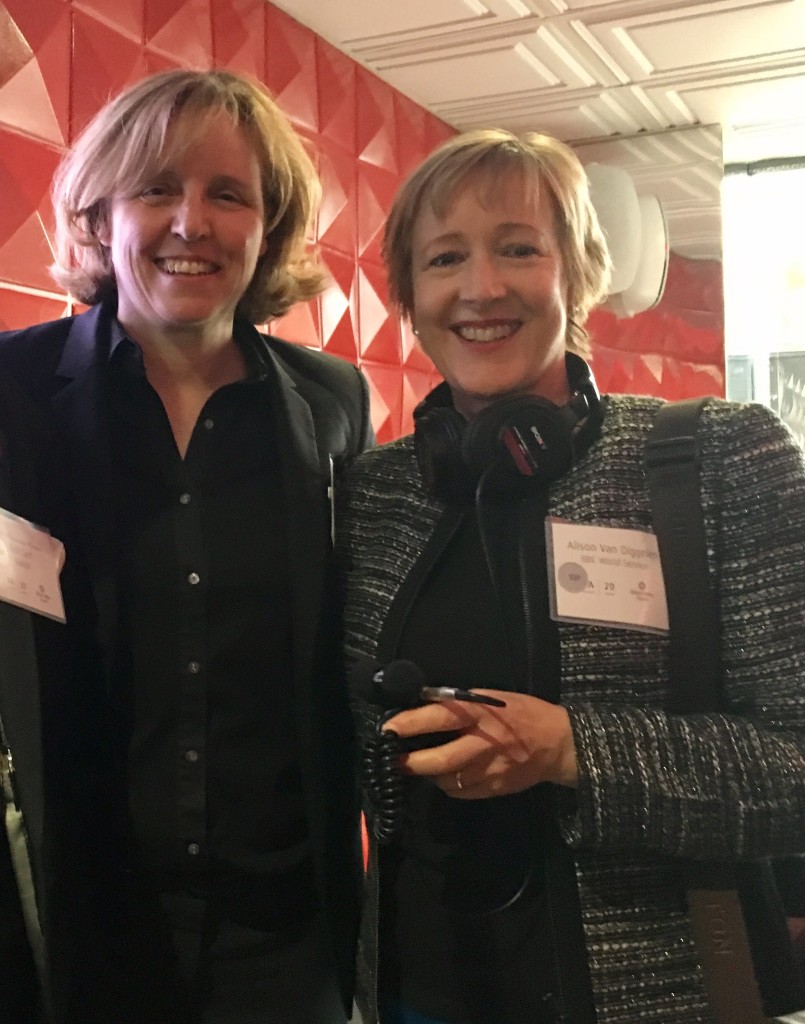 Megan Smith: One of the things I’m going to talk about tonight is this “apprentice- journeyman-master” and Silicon Valley is so good at that. We learn from those who have gone before. I was mentored here in this community by extraordinary people…
Megan Smith: One of the things I’m going to talk about tonight is this “apprentice- journeyman-master” and Silicon Valley is so good at that. We learn from those who have gone before. I was mentored here in this community by extraordinary people…
Alison van Diggelen: Notably, her list is all men. Women make up less than 15% of most tech companies’ technical teams. Why so few?
Megan Smith: We have this strange idea that there’s technical people and non-technical people and it’s a very un-useful cultural problem: stereotyping…The truth is women and men, people of color from every corner of the earth have been doing extraordinary, heroic and technical things and sometimes the stories get lost…
Alison van Diggelen: Smith blames story tellers for ignoring the significant contributions of women at Bletchley Park, at Apple and at NASA. Although she praises the recent “Hidden Figures” movie for finally highlighting the female heroes at NASA during the space race. Ann Winblad echoes the need to raise the profile of role models. She’s an influential venture capitalist in Silicon Valley and received her visionary award back in ‘99, alongside Bill Gates.
Ann Winblad: Women are not hidden figures in this industry. We’re honoring three really strong women tonight…….The more that we do things like these events where we show there are as many strong women to honor as strong men, it will enlighten women that there is a real opportunity.
Alison van Diggelen: Winblad reframes it in FOMO terms…Fear of missing out:
Ann Winblad: Six of the top ten highest valued companies in the world are tech companies…. We all know their names. For women they’re missing a huge opportunity if they don’t join the fastest growing, most exciting industry in the world.
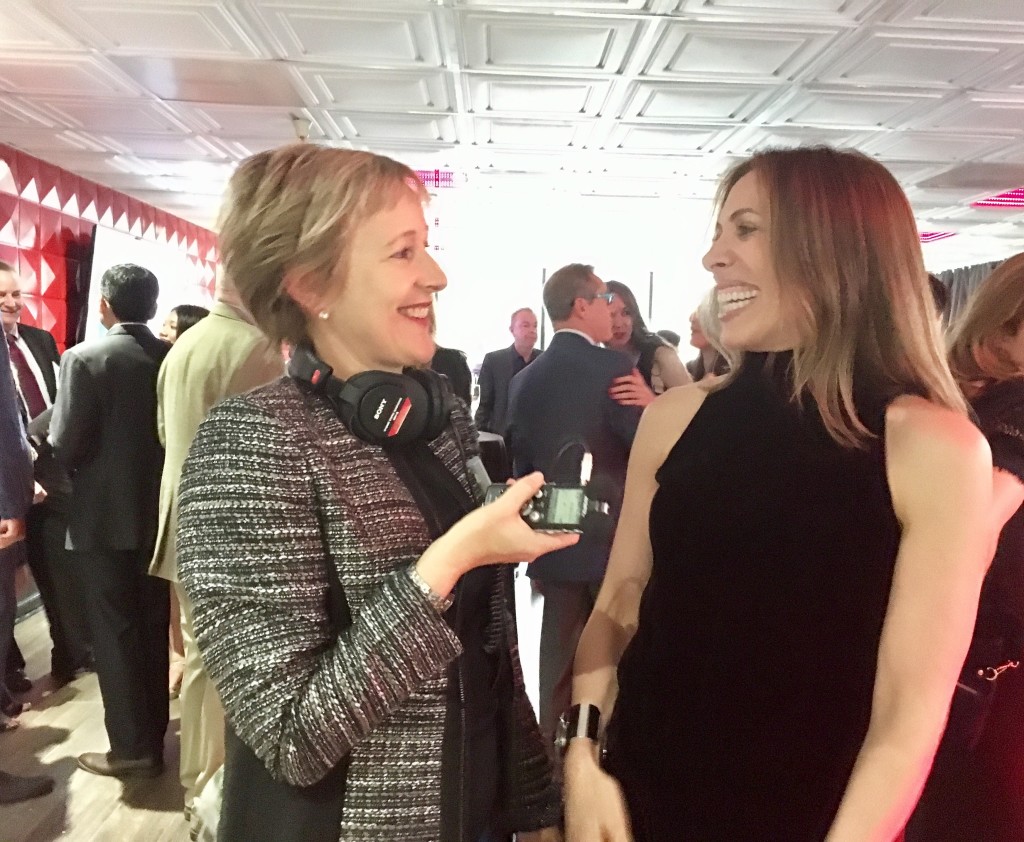
Alison van Diggelen: Linda Rottenberg knows about huge opportunities. Her visionary award is for pioneering Silicon Valley’s high-impact entrepreneurship model around the world. She challenges women to be braver and bolder; and to break stereotypes:
Linda Rottenberg: Not all innovators are boys in hoodies in their 20s: People are going to be over 50, people are going to be women…Sometimes our view of entrepreneurship gets so narrow cast that we dismiss the talent and creativity right in our midst. The biggest risk is taking none at all….
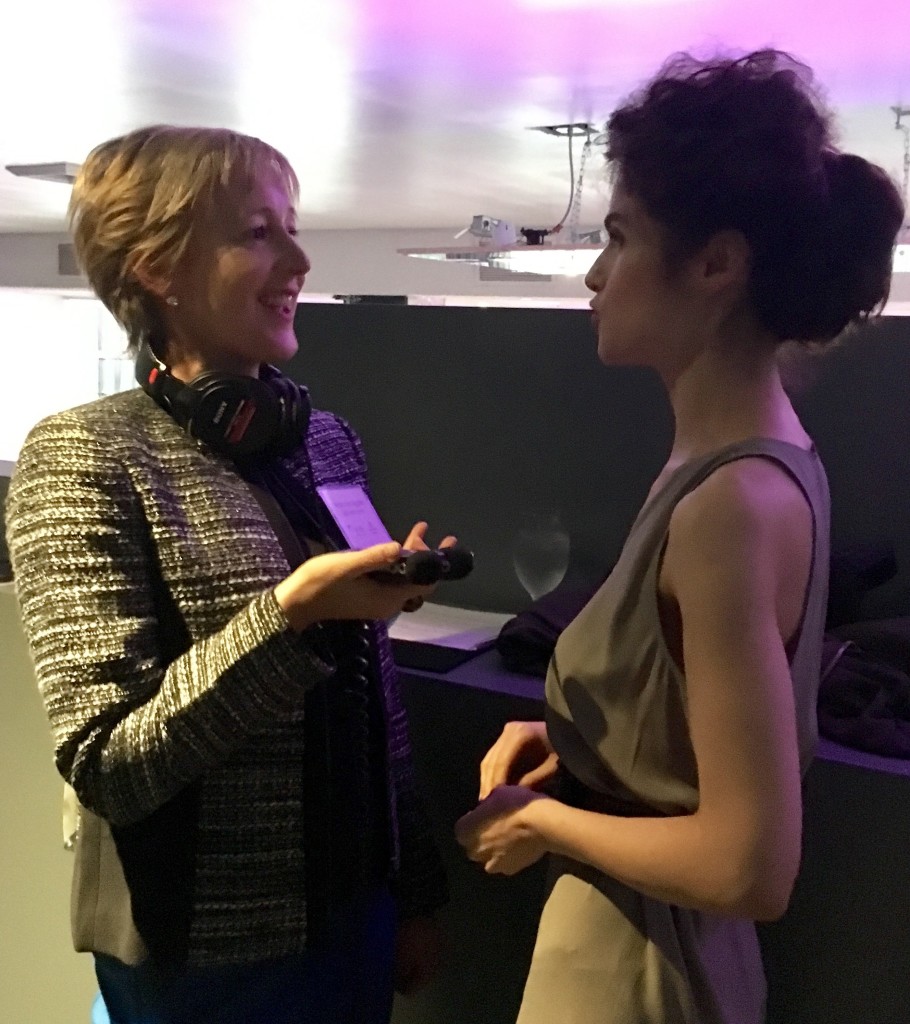
Alison van Diggelen: Fellow visionary, Neri Oxman believes in risk-taking and passion. She’s an inventor and designer at MIT’s Media Lab, famed for her “material ecology” innovations.
Neri Oxman: It’s not easy to define a new field and to generate new technologies for the kinds of project that we are creating, so it requires a suspense of disbelief; and a willingness to fail…
Alison van Diggelen: For her part, Megan Smith is passionate to launch a new tech startup soon to continue her White House mission. She believes that her computer science initiative will help empower many school kids. Here’s President Obama promoting the program back in January 2016…
President Obama: I’ve got a plan to help make sure all our kids get an opportunity to learn computer science, especially girls and minorities. It’s called Computer Science For All. And it means just what it says – giving every student in America an early start at learning the skills they’ll need to get ahead in the new economy…to make sure all our young people can compete in a high-tech, global economy.
Alison van Diggelen: Smith challenges tech leaders for not doing enough to make diversity a top priority:
Megan Smith: It’s really outrageous and irresponsible for the leadership in tech…and it’s also bad for the bottom line. Research shows the more diverse the team, the better financial performance…We’ve got to field the whole human team …it’s especially urgent right now with the beginnings of Artificial Intelligence and data science.
Alison van Diggelen: Celebrating these strong role models – these Wonder Women in Silicon Valley – is one thing, but boosting the pipeline of candidates is vital. Across the US, only 18% of computer science and engineering students are women. As the evening winds down and Silicon Valley’s glitterati disperse into the balmy San Jose evening, Ann Winblad throws down the gauntlet to the next generation:
Ann Winblad: I encourage young women to get excited about science and to make those computer science classes, those engineering classes at least 50% women. If it got higher than 50%, women would OWN the tech industry.
[Crowd, music…fade out] Report ends.
Continue listening to the discussion on BBC’s Business Matters podcast to hear our discussion and my BBC colleague Dave Lee’s report on Nintendo’s comeback.
This report also aired several times on the BBC’s World Business Report
The other visionary awards were presented to pioneering venture capitalist, Steve Jurvetson and Don Eigler, an award-winning nanoscientist.
See more photos of the Visionary Awards and watch video here.
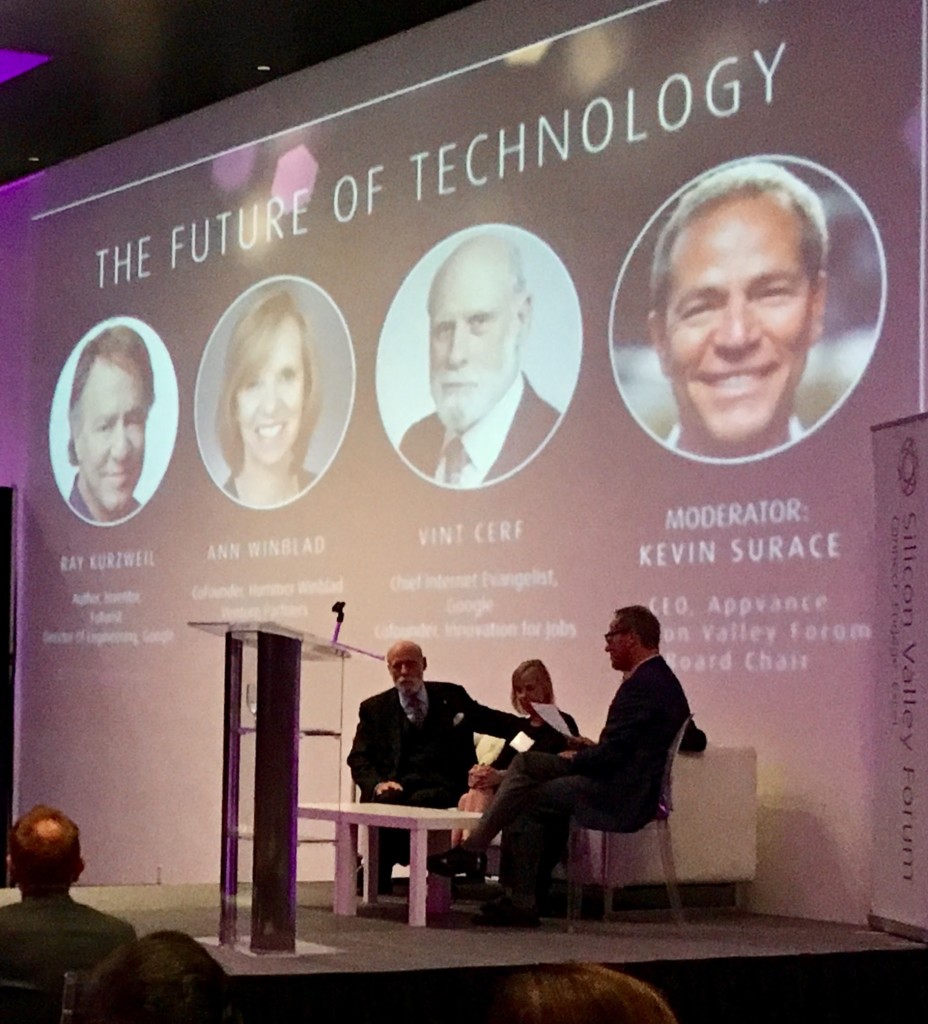
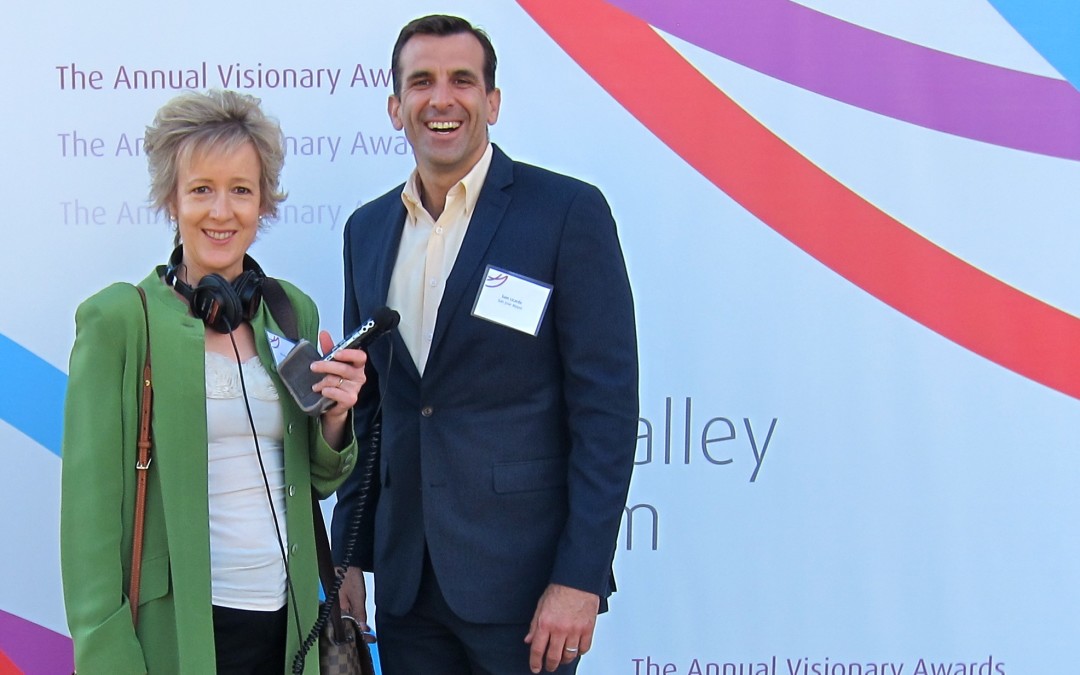
Jun 22, 2016 | BBC World Service, Entrepreneurship, Entrepreneurship & Innovation, Silicon Valley Events, Social Entrepreneurs
By Alison van Diggelen, host of Fresh Dialogues
“Making the world a better place.” This popular mantra of Silicon Valley entrepreneurs is regularly ridiculed by HBO’s popular series, Silicon Valley. For sure, the valley is full of hyperbole and idealistic exuberance, and to many outsiders that may seem completely irrational, insane even, but perhaps it’s a necessary mindset for this innovative region? Are there some entrepreneurs who genuinely want to make the world a better place, not for PR reasons, or to boost their social media following; but just for the sake of it? I attended the 19th annual SVForum Visionary Awards to explore the question.
This is my first report for the BBC World Service tech program, Click.
Listen at the BBC Click podcast (Silicon Valley segment starts at @13:33)
Here’s a transcript of the segment, edited for length and clarity:
Click Radio host, Gareth Mitchell: This is Click from the BBC in London. We talk about technology every week and Silicon Valley is often on the agenda. It’s the kind of place where if you’re a company CEO, and you clock up, say a billion users, most people would say, ‘well that’s incredible,’ but in Silicon Valley, people are likely to say, ‘Oh really?’ It’s almost like a billion seems like a small number, such is the ambition about that place. But Silicon Valley likes to tell us it does have a beating heart through its Visionary Awards and this is where the valley recognizes CEOs and developers who really do want to make the world a better place. From the awards, we have this report from Alison van Diggelen.
Alison van Diggelen: Talk of revolution was in the air in Silicon Valley last week at SVForum’s Visionary Awards. With past recipients like Bill Gates, Elon Musk, and Esther Dyson, these awards have earned a reputation as the Oscars of Silicon Valley. Sam Liccardo, the mayor of San Jose, welcomed guests…
Liccardo: In Silicon Valley we do a great job of innovating; we do a terrible job of celebrating. And it’s important that we stop every once in a while and recognize those who’ve been leading the way and perhaps allow them to inspire us.
van Diggelen: Jennifer Palka is one of this year’s visionary award winners and wants to inspire a revolution by transforming the relationship of the American people with their government. She’s founder of Code for America, a nonprofit that leverages the innovative power of SV technology to help make government work more efficiently, cheaply and openly.
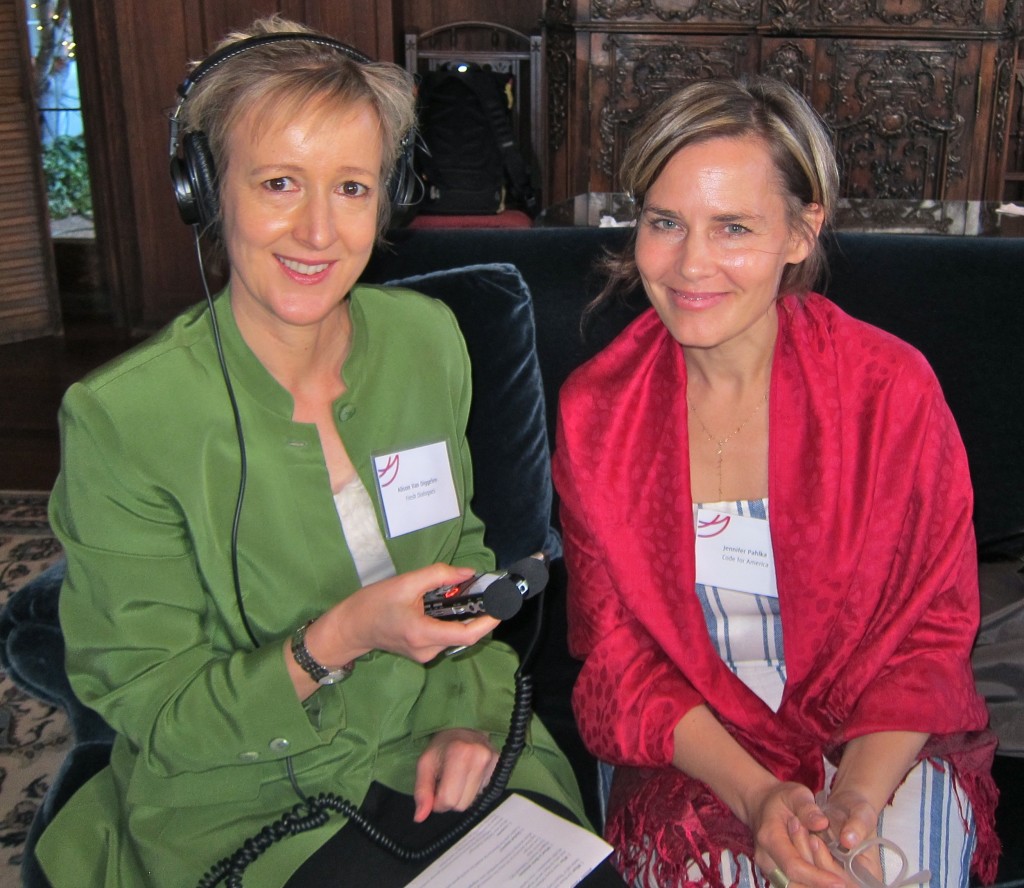 Pahlka: We’ve been trying to make the guts of government… as sexy as making Facebook. People are buying it… by coming into government, they can change the world.
Pahlka: We’ve been trying to make the guts of government… as sexy as making Facebook. People are buying it… by coming into government, they can change the world.
van Diggelen: Remarkably, Code for America has managed to attract many top techies from companies like Apple, Adobe and Google who apply the SV playbook to government.
Pahlka: We believe that government can work better “for the people and by the people” in the 21st Century…the thing we are doing is bringing the practices of SV – user centered, iterative and data-driven approaches to solving problems – into government…by asking people to come and do a year of service.
van Diggelen: Code for America “fellows” make open source apps to address local issues. These are being scaled from local to national level. It’s now easier to apply for food stamps, connect with city hall via text, and get access to public records online. In San Jose, it helped inspire a (waste no food) app that helps hotels and restaurants redirect excess food to feed SV’s homeless. Pahlka’s innovative model has even been adopted by governments around the world. There’s a Code for Japan, Germany, South Africa, and Pakistan. But what really animates Pahlka is how it’s helping redefine SV’s role in the world.
Pahlka: Silicon Valley gets bad rap – we’ve transformed the world, but increased the inequality in our country.
Silicon Valley isn’t just about wealth creation; it’s about bringing people into our institutions in a profoundly valuable way that connects to the history of our country.
van Diggelen: The history of the United States and the need for an open Internet was also top of visionary award winner Tom Wheeler’s mind. A former tech entrepreneur and VC, Wheeler is now Chairman of the Federal Communications Commission, the FCC, which regulates US phone and cable companies; and fights for net neutrality on behalf of consumers and innovators. Wheeler describes broadband as a major driver of economic growth and likens it to coal during the industrial revolution.
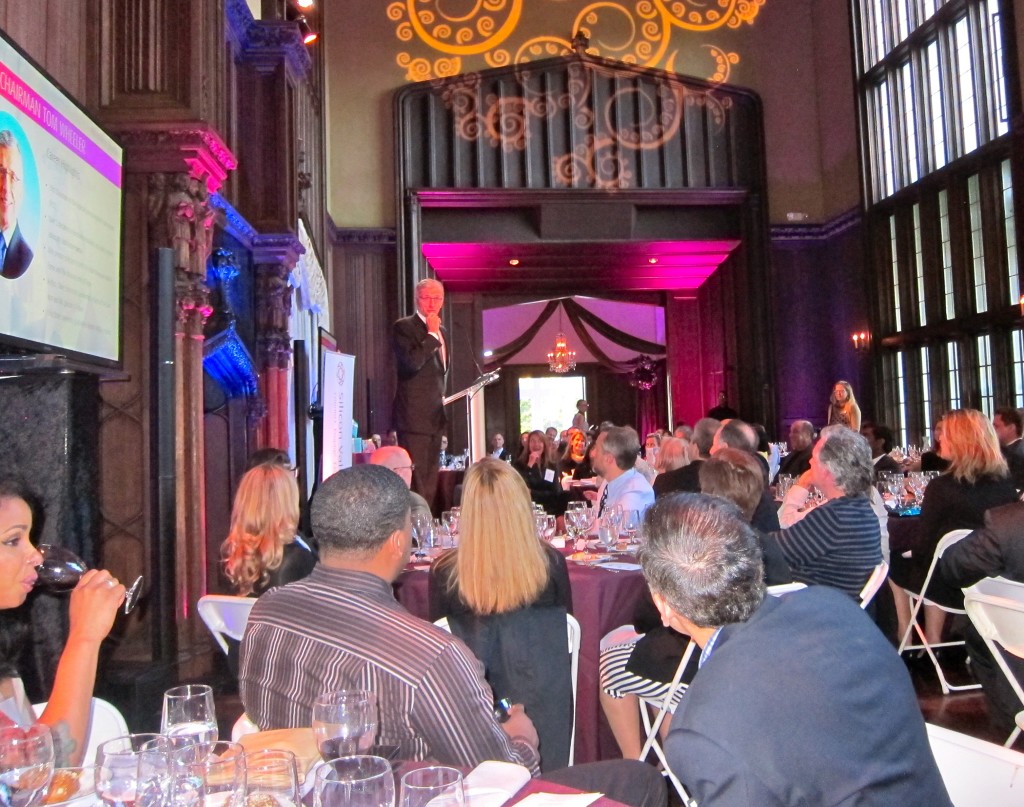 Wheeler: Broadband, high speed Internet is the essential “commodity” of the 21st Century… You can’t be in a situation where you’ve got gatekeepers deciding which innovators get on…
Wheeler: Broadband, high speed Internet is the essential “commodity” of the 21st Century… You can’t be in a situation where you’ve got gatekeepers deciding which innovators get on…
van Diggelen: The European Union is in the process of following a similar model.
But like many tech innovators, Wheeler has a long list of ambitions, including the fight for consumer privacy.
Wheeler: A network gets to see every place you go on the Internet, everything you do. In the phone world, they couldn’t sell that information without your permission. That doesn’t exist today for networks in the high speed Internet, so we’re proposing that it should. The consumer has right to say whether that information can be productized and sold by their network provider.
van Diggelen: As the celebrations come to a close, I asked serial entrepreneur, Kevin Surace to reflect on the evening.
Surace: We’re living in a time when the innovations are coming faster than we’ve ever seen – in the history of ever – we’re now seeing inventions as powerful as the fire or the wheel every month…the pace of innovation is unbelievable.
van Diggelen: A fitting end to an exuberant Silicon Valley evening, where everyone was pumped by the same revolutionary fervor: to make the world a better place.
Ambi –audience exuberance…fade out
Gareth Mitchell: Not that I want to bring the party down, but do they really want to make the world a better place? They might be nice people, but they’re running businesses, they’re pretty hard hearted entrepreneurs at the end of the day, aren’t they?
LJ Rich: There’s something called corporate social responsibility…it’s nice in a way that some companies would like to give back to the community, but it can’t hurt their social reputation, to be seen to be good, especially when you look at how a company’s social behavior is analyzed online and people will suffer if they’re behaving badly or in a way people aren’t impressed by. So yes, I think it’s very nice and altruistic, but there are always pluses to behaving in a responsible manner and some of these will definitely be impacting the bottom line.
Listen to the whole Click program, featuring reports on the future of the Internet; Wonderlab at London’s Science Museum; and a new virtual reality film called Valen’s Reef (about climate change’s impact on our oceans)
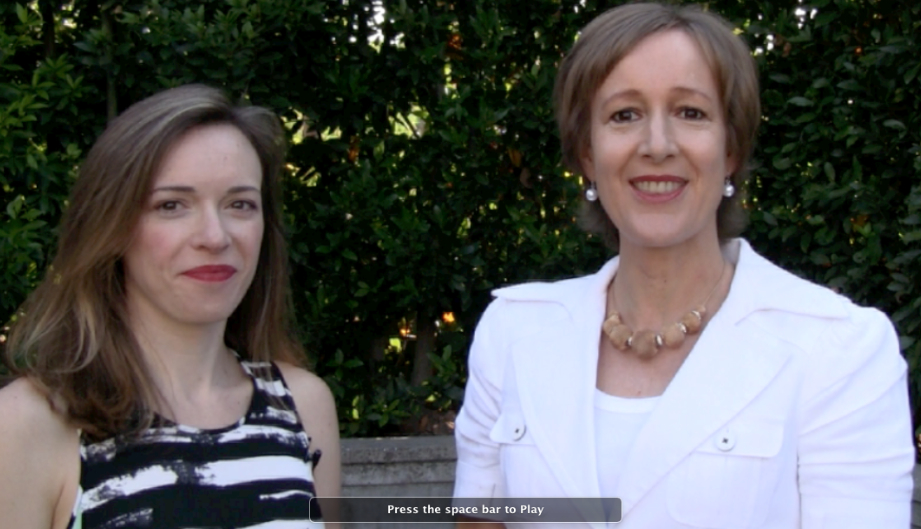
Jun 18, 2014 | Inspiring Women, Women in tech
By Alison van Diggelen, host of Fresh Dialogues
Jackley took a few moments with me to share tips for aspiring entrepreneurs and some clues about her latest startup, launching this Fall.
She enthuses about Silicon Valley being “an incredibly special pocket of the world” where “people have a great capacity to imagine new futures.”
“So many people here have the resources and skills to make these new stories unfold, become real,” she adds.
Here are some highlights of our conversation.
Tips for aspiring entrepreneurs:
1. Be passionate
Do something you are passionate about and have a vision for.
2. Start small
Remember Kiva began with seven entrepreneurs and a little over $3000. It recently surpassed the $500,000,000 mark in microloans to entrepreneurs around the world, serving almost 2 million Kiva users in 76 countries. The average loan amount is $10.
3. Be excellent
Serve one person, or one community well and build from there. Be thoughtful, intentional and think about the details. Study and absorb what’s unfolding in front of you, and be present.
On her new startup
1. Focus
I’m excited to focus on serving working parents…I’m in the trenches right now and that’s the people I want to serve.
2. The Problem
I hope to consult with companies on their policies, culture that supports or doesn’t support working parents. There’s a lot of room for improvement in existing companies.
3. The Solution
My goal is to make it easier and provide options for working parents to prioritize and design their own work and lives around that. Parenting is one of the most entrepreneurial things that I’ll ever do. There’s so much that maps from my experience into motherhood that I want to share with other people. I want to work at the company level and with individuals to demand what they want.
4. The Context
In Europe, it’s top down, (working parents) are taken care of by institutions. I don’t want to wait for that (policy change) to happen here. It’s the better and faster way to go here, in this (US) culture.
Find out more about other SVForum visionary award winners and check back soon for interviews with Stanford’s Tina Seilig, VC Tim Draper and Jennifer Pahlka, founder of Code for America.
Come join the conversation on Facebook
This video is part of a special “Inspiring Women” series at Fresh Dialogues featuring Meryl Streep, Sheryl Sandberg, Jennifer Granholm, Maureen Dowd, and Belva Davis. Check out the YouTube video series here

 T.J. Rodgers was introduced by Eric Benhamou of Benhamou Ventures and described Rodgers as “a tough boss, argumentative and very competitive,” and added “I’m using polite language here.” The audience was well amused .
T.J. Rodgers was introduced by Eric Benhamou of Benhamou Ventures and described Rodgers as “a tough boss, argumentative and very competitive,” and added “I’m using polite language here.” The audience was well amused .

 4. Never miss an opportunity to be fabulous
4. Never miss an opportunity to be fabulous
 Megan Smith: One of the things I’m going to talk about tonight is this “apprentice- journeyman-master” and Silicon Valley is so good at that. We learn from those who have gone before. I was mentored here in this community by extraordinary people
Megan Smith: One of the things I’m going to talk about tonight is this “apprentice- journeyman-master” and Silicon Valley is so good at that. We learn from those who have gone before. I was mentored here in this community by extraordinary people



 Pahlka: We’ve been trying to make the guts of government… as sexy as making Facebook. People are buying it… by coming into government, they can change the world.
Pahlka: We’ve been trying to make the guts of government… as sexy as making Facebook. People are buying it… by coming into government, they can change the world. Wheeler: Broadband, high speed Internet is the essential “commodity” of the 21st Century… You can’t be in a situation where you’ve got gatekeepers deciding which innovators get on…
Wheeler: Broadband, high speed Internet is the essential “commodity” of the 21st Century… You can’t be in a situation where you’ve got gatekeepers deciding which innovators get on…


